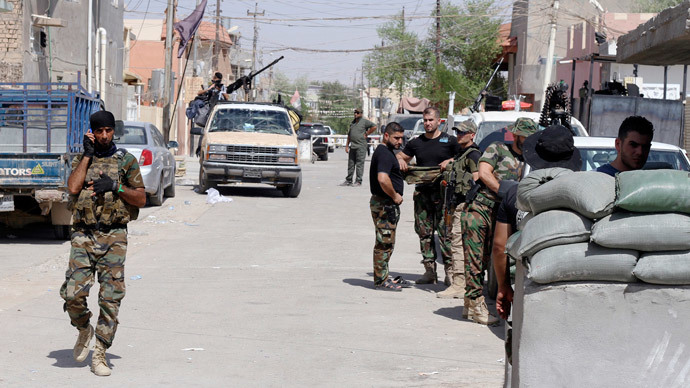‘Obama’s volte-face on ISIS thrusts US into years of perpetual war’

The United States has announced its intentions to counter the Islamic State group by sending 475 additional US troops to Iraq and intensifying airstrikes against ISIS targets in coordination with Baghdad.
US President Barack Obama, during his televised national address, also endorsed a cross-border extension of the US bombing campaign into Syria.
Obama called on Congress to approve a massive $500 million program intended to bolster and equip militants seeking to topple Syrian President Bashar al-Assad. Syrian government officials have reiterated their opposition to US airstrikes, declaring that any strikes on their territory launched without the consent of Damascus would be considered an act of aggression.
Washington’s strategy implies launching airstrikes on a sovereign nation without UN authorization and openly arming non-state militants, which would constitute a major violation of international law. US officials have already conceded that the regional campaign could stretch beyond the end of Obama’s presidency.
Washington’s open-ended escalation of US military action in the region amounts to a unilateral declaration of war. It is important to note that the Obama administration has sidestepped its constitutional obligation to obtain congressional approval for its military campaign, legitimizing its authority from 2001 use-of-force authorization against al-Qaeda that the president himself endorsed repealing last year.
During his speech, the US president likened his administration’s strategy against ISIS to US counterterrorism actions undertaken in Yemen and Somalia. Obama labeled those operations as ‘successful,’ despite generating hundreds of civilian causalities and failing to eliminate al-Qaeda in the Arabian Peninsula or al-Shabaab since the campaigns were expanded after Obama came to office.

In an attempt to assuage public concern, Obama insisted that US military personnel would not be involved in ground combat. This language is misleading considering that the tone of the president’s speech obfuscates how the 1,600 US troops already in Iraq are by definition active duty soldiers and parties to an armed conflict. They will also be coordinating and launching airstrikes.
Despite Iraq being the beneficiary of extensive US military assistance, which included multibillion-dollar training programs for Iraqi Security Forces and police, the Islamic State militants were still able to overrun Iraqi army positions and capture significant quantities of military equipment provided by Washington.
It is unlikely that such a limited contingent of US forces can help the Iraqi army achieve what the previously more extensive training programs could not, which raises the likelihood that more American military personnel would eventually need to be deployed to support the operation, which sets the stage for prolonged mission creep.
The silence of various human rights groups is notable as Washington angles to spend half-a-billion dollars bolstering Syrian anti-government insurgents with training and equipment. A surge of lethal weapons into Syria will fuel bloodshed, exacerbate the already abhorrent humanitarian situation, and increase the probabilities of arms falling into the hands of groups like the Islamic State and other fundamentalist groups, such as Jabhat al-Nursa.
The Islamic State has become the most sophisticated, organized, and entrenched terrorist group in history by virtue of Western and Gulf state’s support for Syrian rebel militias, a fact that has been widely corroborated by various media organizations, investigators and independent journalists.
An exposé recently published in the Washington Post detailed how fighters trained under the auspices of covert CIA programs approved by the Obama administration have joined the ranks of the Islamic State. Western and Gulf states, according the report, knowingly armed and trained Islamist fighters with jihadist leanings and anti-Western views to fight and topple the governments of Libya and Syria.
The Washington Post’s report, which cites senior US and Arab intelligence figures and members of the Islamic State, claims that many fighters who now belong to the Islamic State and Jabhat al-Nusra were previously trained by French, British, and American military and intelligence personnel.

Countries such as Russia, China, and Iran consistently raised objections to Western and Gulf policies in Syria throughout the duration of the conflict in that country, warning of the dangerous potential for extremists to exploit the lawless space in areas outside the Syrian government’s control. Those concerns have proven to be entirely accurate.
The Obama administration, in addition to US allies such as Saudi Arabia, Turkey, Qatar, Jordan, and Kuwait, bear the ultimate responsibility for giving rise to the organization they are now scrambling to fight through their support for the anti-Assad insurgency. At this stage, any further support for militant groups in Syria by Western and Gulf States is a moral outrage, in addition to being a violation of international law.
Washington’s stated objective is to diminish the threat of ISIS, but in practice, renewed intervention in the region will fuel the Syrian insurgency and undermine the legitimate government in Damascus. Airpower is also needed in this scenario to safeguard US allies, as well as to protect American facilities and investment interests.
US client states in the region, mostly Sunni monarchies, are already in a vulnerable position due to the growing reach of fundamentalists. In some cases, members of the population in these countries sympathize with the Islamic State. These concerns have motivated Saudi Arabia to construct a 900km fence along its northern border with Iraq, in addition to deploying 30,000 troops to secure the kingdom’s frontiers.
The Saudi kingdom has played a key role emboldening the Islamic State through its support for radical groups in Syria. By virtue of its oil wealth, the House of Saud has spent the last three decades promoting the Salafist interpretation of Islam (labeled widely as Wahhabism throughout Western discourse) in missionaries throughout the Islamic world. Their interest is in entrenching the royal family’s power and uncontested legitimacy of the King as the Custodian of the Two Holy Mosques.
Countless fundamentalist jihadi groups fighting in Syria subscribe to Salafism, which seeks to revive a pure and unadulterated Islam that was practiced by the earliest generations of Muslims in seventh century Arabia. Adherents tend to endorse exclusionist and puritanical practices whereby they declare non-Muslims and even fellow Muslims as apostates or infidels, who are usually punished by death.
The United States has long tolerated the House of Saud’s management of Sunni Islam by exporting radical Salafism throughout the Islamic world, in the interest of furthering its own strategic foreign policy objectives. This fundamentalist interpretation of Islam has served as the ideological engine for radical groups that Riyadh and Washington have attempted to utilize in Syria.
The Islamic State group, though fitting into the category of a Salafist organization, differentiates itself by forcefully denying the House of Saud’s claim of authority to rule. Alastair Crooke, former British diplomat and MI6 agent, described the group as “a corrective movement to contemporary Wahhabism,” whose self-declared caliph, Abu Bakr al-Baghdadi, claims to be the leader of all Muslims.
In a move that borders on satire, Saudi Arabia has agreed to a recent American request that the kingdom provide a base to train so-called ‘moderate’ Syrian rebel fighters. Saudi Arabia has publically beheaded some 23 people last month alone, for drug-trafficking and petty crimes. This should raise questions about Obama’s partners in Riyadh, considering the moral outrage on display throughout the Western world over the brutal executions of James Foley and Steven Sotloff.

The United States has failed to eradicate terrorist organizations in other war theaters throughout the region, and there is no reason to believe it will be any more successful against the Islamic State group, especially when its strategy depends on disenfranchised proxy forces, such as the Western-backed rebel militias. As demonstrated elsewhere, the use of airstrikes will almost certainly create unintended consequences, such as civilian casualties that can fuel anti-US sentiment and embolden the fundamentalist cause.
Once the air campaign begins in Syria, the choice of targets will reveal the administration’s true motivations for involvement. Damascus will likely not react to strikes against ISIS targets, but if the government’s facilities or supply routes are threatened, it could be provoked to respond. Figures in the US establishment will likely endorse the rationale that the US air campaign must strike both rebel and government targets to avoid giving either side a strategic advantage. Needless to say, the next US administration will be inheriting a seemingly endless humanitarian disaster.
The statements, views and opinions expressed in this column are solely those of the author and do not necessarily represent those of RT.
The statements, views and opinions expressed in this column are solely those of the author and do not necessarily represent those of RT.












